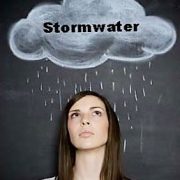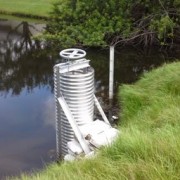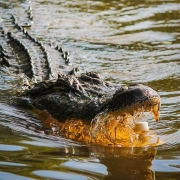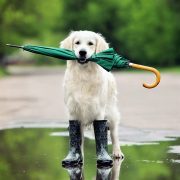Flooding: Frequently Asked Questions
How does flood control work?
Flood control in South Florida is a shared responsibility and is achieved through an interconnected, three-tiered drainage system. Neighborhood drainage systems, or tertiary systems, are operated by property owners or residential associations. Secondary flood control canals are operated by the Lake Worth Drainage District, and primary flood control is provided by the South Florida Water Management District. Neighborhood drainage systems are designed to retain water in swales and onsite retention ponds. With prior authorization from the Lake Worth Drainage District, excess stormwater may be discharged from neighborhood systems into District canals through control structures with fixed or operable weirs to prevent flooding of property.
I have standing water is my driveway, is this considered flooding?
Since the mid-1970s, development standards for drainage systems have been regulated through design and permitting to ensure flood protection. Average rainfall will flow into onsite stormwater retention ponds through swales and drains. During heavy rain events, systems are designed to protect house floor pads. Temporary flooding of streets, sidewalks and driveways is expected and is part of the drainage design. These low-lying areas will hold back stormwater keeping it away from homes.
Who do I call if I experience flooding from a storm or natural disaster?
If your neighborhood is part of a residential association, you should contact your property manager or board first. In many cases these individuals and LWDD have already communicated about conditions. Other property owners can contact the local government responsible for ensuring that ditches and canals are adequate, clean and functioning properly. This may be the Lake Worth Drainage District, your local municipality, Palm Beach County or the South Florida Water Management District. Before storm season, property owners should have the name and contact information for this entity easily available.
What is the Lake Worth Drainage District’s role in flood protection?
- Working with local governments and residential communities during and after a storm to provide emergency discharge of excess stormwater.
- Operating and maintaining more than 20 major and minor water control structures
- Permitting drainage infrastructure discharging into LWDD canals.
- Maintenance of approximately 500 miles of canal and 1,000 miles of rights-of-way for the free flow of water and emergency access
- Assisting local governments in emergency response during disasters, when called upon.
How do stormwater ponds help reduce flooding impacts?
Stormwater ponds help control flooding by slowing down stormwater surges and absorbing rainwater before it reaches properties. They provide for the control rate of drainage through discharge control structures or weirs. They also help filter out nutrients and sediments collected by storm water as it runs over the ground before pollutants reach fragile waterways.
Who is responsible for maintaining my neighborhood stormwater pond?
Maintenance of private stormwater systems is the responsibility of the developer or homeowners association. You can find out who owns and maintains stormwater areas by visiting the Property Appraiser’s website at www.pbcgov.org/papa and searching for the parcel and its owner. Permits and design plans for a community’s drainage system can be obtained through the South Florida Water Management District. They offer an online permit search on their website at www.sfwmd.gov/permitting.
What can I do to reduce the potential of flooding?
- Report clogged culverts or slow-moving water in canals or swales to your property management company or responsible local government. Report issues when you see them to allow adequate time for maintenance or repairs before a storm.
- Keep grass clippings and other debris out of stormwater drainage systems to prevent clogging and loss of stormwater storage and treatment capacity.
- Clean out rain gutters and extend downspouts at least four feet from structures. Direct the discharge away from canals to avoid washouts in canal banks.
- Become informed and learn more about what to expect and how to protect your home and sign-up to receive our newsletter at our website lwdd.net. The monthly publication contains articles on important public safety topics like water management, quality and quantity.
Can the Lake Worth Drainage District control water levels in canals for flood relief?
Yes. Water levels in canals are monitored and control structures flood gates may be opened to release excess stormwater for flood control. However, control structures must operate to ensure sufficient water is released for flood control without letting so much water go that we threaten the stability of the underground aquifer and municipal wellfields. While the Lake Worth Drainage District operates control structures within its canal system, it does not control flood control discharge points which are managed by the South Florida Water management District.
Does flooding occur only during hurricanes?
No. Flooding may be experienced when we receive extreme volumes of rainfall in a brief period and rainfall exceeds the water management system design. Flooding may also occur when culverts and storm drains are blocked with materials and vegetation which slows down drainage. It is important to note that you do not need to be in a designated flood zone to experience flooding. If rainfall is severe or the free flow of water is hampered, flooding can occur miles inland from a canal or other waterbody. Residents should be aware that flood insurance is not automatically part of the homeowner policy. The choice to obtain flood insurance is a personal one and should be discussed with your insurance agent. Flood insurance information can be found at www.floodsmart.gov.
If you have additional questions, please do not hesitate to contact us at 561-498-5363 or info@lwdd.net for more information.






